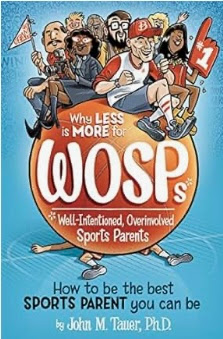Coach John Tauer is the head men’s basketball coach at St.Thomas University in Minnesota. St. Thomas has gone from D3 to D1 in basketball. Coach Tauer has a PhD in Psycholgoy with his background in social-psychology. He actually taught Soc-Psych on a college level. He is the author of Why Less Is More for WOSP’s (Well-Intentioned, Over-Involved Sports Parents.
Here are some highlights from his interview on Slappin’ Glass Podcast.
Source of Player Motivation
When parents are asked,”What do you hope your son/daughter will get out of sports?” The parents most common replies are:
Parents do not like to see their son/daughter in pain. That may mean pain from dealing with a loss, pain from not starting, pain from not playing, pain from being told something critical by a coach, etc. Parents can become angry at anything or anyone who they feel contributes to any level of pain in their child.
The classic is the parent who drops their son/daughter off at the gym or field for a game. As the athlete leaves the car, the parent says, “Just have fun!”
Coaches tend to play their favorites- players who are good listeners, hard workers, coachable, shoot well, defend, handle the ball, etc.
We need to realize that everyone operates on both “intrinsic motivation” and “extrinsic motivation.” Intrinsic motivation means that we get a joy in taking part in an activity, without thoughts of money, prestige, praise, or acknowledgement. While everybody is motivated by both, if there is not some level of intrinsic motivation, a person’s success probability goes down. In those cases, no matter how much a parent pays their kid for points or promises a car if…, it doesn’t usually work.
Becoming a WOSP
1- Unrealistic expectations about their son/daughter’s skill and interest set.
2- Lack of trust in the coach.
3- Blind love of their child.
Tauer believes while coaches tend to think it is lack of trust in the coach, his experience shows it is out of blind love of their child.
Purpose of Sports
When parents are asked,”What do you hope your son/daughter will get out of sports?” The parents most common replies are:
1- Character development
2- Develop teamwork
3- Build unselfishness
4- Learn to compete
Yet when you ask coaches what concerns they hear from parents, the parent complaints rarely have anything to do with the reasons listed above. When coaches are asked, “What emails do you receive from parents?” The unanimous reply is PLAYING TIME.
Dealing With Pain
Parents do not like to see their son/daughter in pain. That may mean pain from dealing with a loss, pain from not starting, pain from not playing, pain from being told something critical by a coach, etc. Parents can become angry at anything or anyone who they feel contributes to any level of pain in their child.
According to Tauer, “Sports is actually a vehicle that can provide, if do right, an adequate amount of pain for kids to work through in a safe way and learn lessons that they’re going to need when they’re 22 years old.”
Dealing with certain levels of pain leads to valuable growth. Some of the best lessons in sports are painful but valuable. Telling an athlete what they need to hear, they may not like it but they need to hear it and grow from it.
“Have Fun”
The classic is the parent who drops their son/daughter off at the gym or field for a game. As the athlete leaves the car, the parent says, “Just have fun!”
When the athlete gets in the same car after the game or after practice, the first thing out of the parent’s mouth is, “How did you do?” Parents too often go from wishing their son/daugher has a great experience to worrying about whether they won or lost, and how many points they scored.
If the priority of a parent is that their athlete uses sports to develop character, they need to talk about character. The main conversation between a parent and an athlete should not be about how to better execute a drop step, how to get open for shots, or errors of teammates and coaches. Parents should be stirring conversation to things like unselfishness, team unity, work ethic, handling adversity. Sports can be a great vehicle for character development but that is what the conversations need to be about.
Coaches Have Favorites
Coaches tend to play their favorites- players who are good listeners, hard workers, coachable, shoot well, defend, handle the ball, etc.
Coach Tauer believes when a player is frustrated about their role on the team, as a parent you should say, “You are not getting what you want- there is a reason. Go talk to the coach, there is something you are doing or not doing that is not what the coach wants.”
The key is that a player needs to be guided by the parent to:
1- Have the player not the parent have the conversation.
2- Go in a respectful tone.
3- You are not going to the coach to debate them.
Why aren’t you getting what you want? The coach has the answer. It doesn’t mean the coach is always right, but he/she makes the decisions. Roles can change but not necessarily when we want them to change.






No comments:
Post a Comment